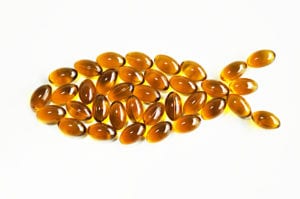Written by Harold Oster, MD. Results suggest that fish oil supplementation is associated with decreased risk of coronary artery disease in adult diabetics and prediabetics.
 Type 2 diabetes affects over 450 million people, representing more than 9% of the population. Diabetes increases the risk of coronary artery disease (CAD) as much as fourfold1. Fish oil supplementation has a favorable effect on serum lipids2 and inflammation3, known risk factors for coronary artery disease4,5, and has been shown to lower the risk of coronary artery disease in some studies6.
Type 2 diabetes affects over 450 million people, representing more than 9% of the population. Diabetes increases the risk of coronary artery disease (CAD) as much as fourfold1. Fish oil supplementation has a favorable effect on serum lipids2 and inflammation3, known risk factors for coronary artery disease4,5, and has been shown to lower the risk of coronary artery disease in some studies6.
Xiaohui Liu, et al. studied the association between regular fish oil supplementation and the risk of coronary artery disease among participants in UK Biobank, a biomedical database containing health information from 500,000 participants. Based on defined inclusion criteria, data from 22,146 individuals with diabetes (defined as having a hemoglobin A1c over 6.4%) and 47,663 with prediabetes (hemoglobin A1c between 5.7% and 6.4%) was analyzed. From 2006-2010, participants completed detailed questionnaires regarding lifestyle, socioeconomic factors, medical history, supplement use, including fish oil, and other possible covariates for coronary disease. At baseline, face-to-face interviews and physical examinations were performed, and blood samples were collected. Serum was tested for lipids, hemoglobin A1c, the hormone insulin-like growth factor-1 (IGF-1), and c-reactive protein (CRP), a marker of inflammation. To confirm regular consumption of fish oil, two assessments were performed over the following three years. Participants were followed until December 31, 2020. Cases of coronary artery disease were identified through hospital records and self-reported data.
The authors noted the following:
- 5% of diabetics and 33.4% of prediabetics regularly consumed fish oil supplements.
- Participants who took fish oil were more likely than non-users to engage in physical activity, adhere to a healthier diet, have hypertension, hyperlipidemia, and a family history of coronary artery disease. They also were more likely to take other supplements, aspirin, and cholesterol-lowering medication. Diabetics who took fish oil had a shorter duration of diabetes than those who did not.
- Among participants with prediabetes, 4304 cases of CAD were identified. Among diabetics, 3294 cases of CAD were identified.
- In diabetics and prediabetics, after adjustment for age and sex, there was an inverse association between regular fish oil supplementation and cases of coronary artery disease. This association persisted after adjustment for socioeconomic factors, diet, and the use of other supplements and medications.
- Fish oil supplementation was associated with more favorable lipid profiles and a lower CRP.
- In mediation analysis, a statistical technique to evaluate a possible mechanism of benefit, mediators of CAD incidence in prediabetics included CRP, IGF-1, total cholesterol, and the lipid component HDL-C.
- In diabetics, mediators of CAD included HbA1c, CRP, and the lipid proteins small LDL-C, VLDL-C, HDL-C, and apoA.
Results of the study suggest that regular fish oil supplementation is associated with a lower risk of coronary artery disease in adults with diabetes and prediabetes. Limitations of the study include its observational rather than experimental design, lack of information on the dosing and formulation of fish oil supplements, and possible residual confounding variables.
Source: Liu, Xiaohui, Yin Li, Xuzhi Wan, Pan Zhuang, Yuqi Wu, Lange Zhang, Yang Ao, Jianxin Yao, Yu Zhang, and Jingjing Jiao. “Association of Fish Oil Supplementation with Risk of Coronary Heart Disease in Individuals with Diabetes and Prediabetes: A Prospective Study in the UK Biobank.” Nutrients 15, no. 14 (2023): 3176.
© 2023 by the authors. Licensee MDPI, Basel, Switzerland. This article is an open access article distributed under the terms and conditions of the Creative Commons Attribution (CC BY) license (https://creativecommons.org/licenses/by/4.0/)
Click here to read the full text study.
Posted August 8, 2023.
Harold Oster, MD graduated from medical school in Miami, Florida in 1992 and moved to Minnesota in 2004. After more than 25 years of practicing Internal Medicine, he recently retired. Dr. Oster is especially interested in nutrition, weight management, and disease prevention. Visit his website at haroldoster.com.
References:
- Rajbhandari J, Fernandez CJ, Agarwal M, Yeap BXY, Pappachan JM. Diabetic heart disease: A clinical update. World journal of diabetes. Apr 15 2021;12(4):383-406. doi:10.4239/wjd.v12.i4.383
- Dibaba DT. Effect of vitamin D supplementation on serum lipid profiles: a systematic review and meta-analysis. Nutr Rev. Dec 1 2019;77(12):890-902. doi:10.1093/nutrit/nuz037
- Souza DR, Pieri B, Comim VH, et al. Fish oil reduces subclinical inflammation, insulin resistance, and atherogenic factors in overweight/obese type 2 diabetes mellitus patients: A pre-post pilot study. J Diabetes Complications. May 2020;34(5):107553. doi:10.1016/j.jdiacomp.2020.107553
- Colantonio LD, Bittner V, Reynolds K, et al. Association of Serum Lipids and Coronary Heart Disease in Contemporary Observational Studies. Circulation. Jan 19 2016;133(3):256-64. doi:10.1161/circulationaha.115.011646
- Tiong AY, Brieger D. Inflammation and coronary artery disease. Am Heart J. Jul 2005;150(1):11-8. doi:10.1016/j.ahj.2004.12.019
- Li ZH, Zhong WF, Liu S, et al. Associations of habitual fish oil supplementation with cardiovascular outcomes and all cause mortality: evidence from a large population based cohort study. Bmj. Mar 4 2020;368:m456. doi:10.1136/bmj.m456
